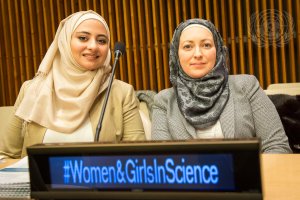
Where We Are
Education plays a pivotal role in reducing inequality, fostering economic growth, and empowering individuals to live fulfilling lives. From early childhood development to lifelong learning, access to quality education is essential for achieving the Sustainable Development Goals. The world has made progress in increasing school enrolment rates and improving literacy levels, but significant challenges remain. Meeting SDG 4 requires investments in education infrastructure, enhanced teacher training, and policies that address barriers to equal access, particularly for girls and children with disabilities.
The Pact for the Future reinforces commitments to SDG 4 by calling for expanded digital access in education through initiatives like Giga, aiming to connect 100% of schools to the internet. It also promotes digital literacy, teacher training, and targets education funding to bridge learning gaps and ensure equitable, future-ready education systems.
SDG 4 in Numbers
- Progress towards Goal 4 has been slow since 2015, with only 58% of students worldwide achieving a minimum proficiency in reading by 2019.
- To meet national 2030 education targets, countries must annually enroll 1.4 million children in early childhood education, admit a new child to school every 2 seconds until 2030 and triple annual progress in primary completion rates.
- Globally, girls’ completion rates exceed those of boys by 2 to 3 percentage points in both primary and secondary education.
- Globally, only half of primary schools and just 62 per cent of secondary schools have basic infrastructure for students with disabilities.

“Education is a fundamental human right, central to the dignity and empowerment of individuals, to driving sustainable development, and to building peace.”
– António Guterres, UN Secretary-General
Key Events
5 February | ECOSOC Partnership Forum

The ECOSOC Partnership Forum provides a platform for UN Member States, the private sector, civil society, and other stakeholders to explore innovative partnerships for advancing the Sustainable Development Goals (SDGs). Discussions will focus on the theme “Advancing sustainable, inclusive, science and evidence-based solutions for the 2030 Agenda for Sustainable Development and its Sustainable Development Goals for leaving no one behind”. Further details and materials can be found here.
10-14 February | Commission for Social Development

In the lead-up to the Second World Summit for Social Development in November this year, the 63rd session of the Commission for Social Development will be take place in New York from 10 to 14 February. Key topics of this session include strengthening solidarity, social inclusion and social cohesion to accelerate the delivery of the commitments of the Copenhagen Declaration on Social Development and Programme of Action of the World Summit for Social Development.
25-27 February | Resumed sessions of the UN Biodiversity Conference (COP 16.2)

Taking place at the Food and Agriculture Organization of the UN (FAO) headquarters in Rome, the UN Biodiversity Conference will reconvene to continue discussions on key issues from its Conference held in Cali, Colombia in December 2024. Resumed sessions will address issues on financial mobilization and mechanisms for biodiversity, and reporting and monitoring tools for the Kunming-Montreal Global Biodiversity Framework.
International Days and Years
6 February | International Day of Zero Tolerance for FGM

This day shows the global commitment to eliminate female genital mutilation (FGM), a harmful practice affecting girls and women worldwide. The 2025 theme focuses on “Stepping Up the Pace” and calling on everyone to join the movement to end these harmful practices. Learn more about ways to engage and join the call to action here.
11 February | International Day of Women and Girls in Science

This day recognizes the critical role of women and girls in science and innovation, highlighting gender equality in STEM fields as essential for achieving the SDGs. This year’s celebration, marking the 10th anniversary of the International Day, will focus on “Unpacking STEM Careers: Her Voice in Science” with a hybrid event at the UNESCO Headquarters in Paris, France. Additional details on the event and participation options can be found here.
13 February | World Radio Day

World Radio Day celebrates the influence of radio as a medium for education, information, and cultural exchange. The 2025 theme is dedicated to “Radio and Climate Change” to support radio stations in their journalistic coverage of this critical topic. For engagement opportunities, please visit the UNESCO site here.
17 February | Global Tourism Resilience Day

Global Tourism Resilience Day highlights the importance of building a more resilient tourism sector to withstand crises. In 2024, the General Assembly proclaimed 2027 as the International Year of Sustainable and Resilient Tourism. This is an opportunity for all actors and the UN system to support sustainable and resilient tourism as a means of promoting sustainable development.
21 February | International Mother Language Day

This year marks the 25th anniversary of the International Mother Language Day. The global event organized at UNESCO Headquarters in Paris, France, under the theme “Languages matter: Silver Jubilee Celebration of International Mother Language Day”, will highlight the urgency of accelerating progress on linguistic diversity to build a more inclusive and sustainable world by 2030. Additional details and participation resources can be found here.

